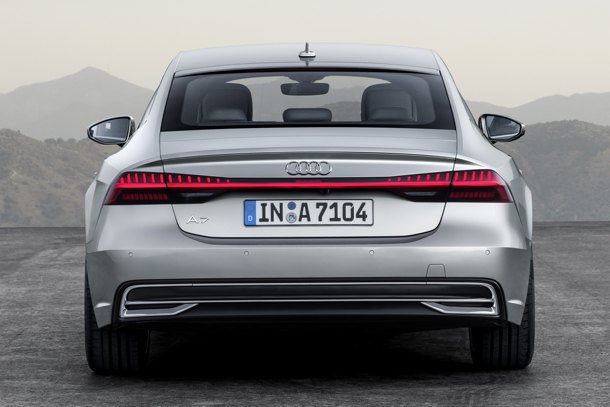Utterly Ridiculous New Audi Nomenclature Scheme Is Not Happening in the United States
See that new Audi A3 with between 109 and 129 horsepower? That’s an Audi A3 30. And see the badge on the back of that Audi A4 2.0T? Right, it doesn’t say 2.0T. It says Audi A4 45.
Huh?
Exactly. Huh. Many huhs. “Huh?” is being heard everywhere. In fact, even within Audi, “Huh?”, was an expression heard often enough that Audi of America won’t be adopting the new model designation format. That’s a relief.
Remember when you looked at the back of a German car and could instantly decipher its engine displacement?
Ah, yes, the BMW 328i, a 3 Series with a 2.8-liter inline six. The Mercedes-Benz S500, an S-Class with a 5.0-liter V8. The Audi A4 2.0T, aforementioned, with a 2.0-liter turbocharged four-cylinder. It all made so much sense.
For the 2018 model year, the BMW 340i is equipped with a 3.0-liter turbocharged straight six. Same engine as the BMW 330i? Of course not: the 330i uses a 2.0-liter turbo. At Mercedes-Benz, the 2018 S450 has a 3.0-liter turbocharged V6 under the hood. And if S63 has you thinking V12, don’t be so silly. That’s a 4.0-liter turbocharged V8.
Granted, it’s not just the Germans. Slathered across the trunklid of the 2018 Lexus LS is an LS500 badge, but the car features a 3.5-liter turbo V6. Even worse, the 2018 Lexus IS uses a different engine in the Lexus IS300 and the Lexus IS300 AWD.
Fortunately, Audi will refrain from utilizing the most confusing badging scheme of them all, Car And Driver reports, “at least for the time being.” Audi is certainly making enough headway in America without absolutely bewildering consumers. Sales have risen in 81 consecutive months, jumping 6 percent in the U.S. through the first nine months of 2017 even as industry-wide sales slip 2 percent.
[Images: Audi AG]
Timothy Cain is a contributing analyst at The Truth About Cars and Autofocus.ca and the founder and former editor of GoodCarBadCar.net. Follow on Twitter @timcaincars and Instagram.
More by Timothy Cain
Latest Car Reviews
Read moreLatest Product Reviews
Read moreRecent Comments
- Fred I would get the Acura RDX, to replace my Honda HR-V. Both it and the CRV seats are uncomfortable on longer trips.
- RHD Now that the negative Nellies have chimed in...A reasonably priced electric car would be a huge hit. There has to be an easy way to plug it in at home, in addition to the obvious relatively trickle charge via an extension cord. Price it under 30K, preferably under 25K, with a 200 mile range and you have a hit on your hands. This would be perfect for a teenager going to high school or a medium-range commuter. Imagine something like a Kia Soul, Ford Ranger, Honda CR-V, Chevy Malibu or even a Civic that costs a small fraction to fuel up compared to gasoline. Imagine not having to pay your wife's Chevron card bill every month (then try to get her off of Starbuck's and mani-pedi habits). One car is not the solution to every case imaginable. But would it be a market success? Abso-friggin-lutely. And TTAC missed today's announcement of the new Mini Aceman, which, unfortunately, will be sold only in China. It's an EV, so it's relevant to this particular article/question.
- Ajla It would. Although if future EVs prove relatively indifferent to prior owner habits that makes me more likely to go used.
- 28-Cars-Later One of the biggest reasons not to purchase an EV that I hear is...that they just all around suck for almost every use case imaginable.
- Theflyersfan A cheaper EV is likely to have a smaller battery (think Mazda MX-30 and Mitsubishi iMEV), so that makes it less useful for some buyers. Personally, my charging can only take place at work or at a four-charger station at the end of my street in a public lot, so that's a crapshoot. If a cheaper EV was able to capture what it seems like a lot of buyers want - sub-40K, 300+ mile range, up to 80% charging in 20-30 minutes (tops) - then they can possibly be added to some lists. But then the issues of depreciation and resale value come into play if someone wants to keep the car for a while. But since this question is asking person by person, if I had room for a second car to be garaged (off of the street), I would consider an EV for a second car and keep my current one as a weekend toy. But I can't do a 50K+ EV as a primary car with my uncertain charging infrastructure by me, road trips, and as a second car, the higher insurance rates and county taxes. Not yet at least. A plug in hybrid however is perfect.



































Comments
Join the conversation
This is one of those cases where a focus group is needed. It should be 6-year-olds who will pan anything that doesn't make sense to them.
Those numbers feel a bit like the "Tax Horesepower" the French, and before them the Brits, used to have. Citroên 2 CV, Audi 35... Yup, same thing.